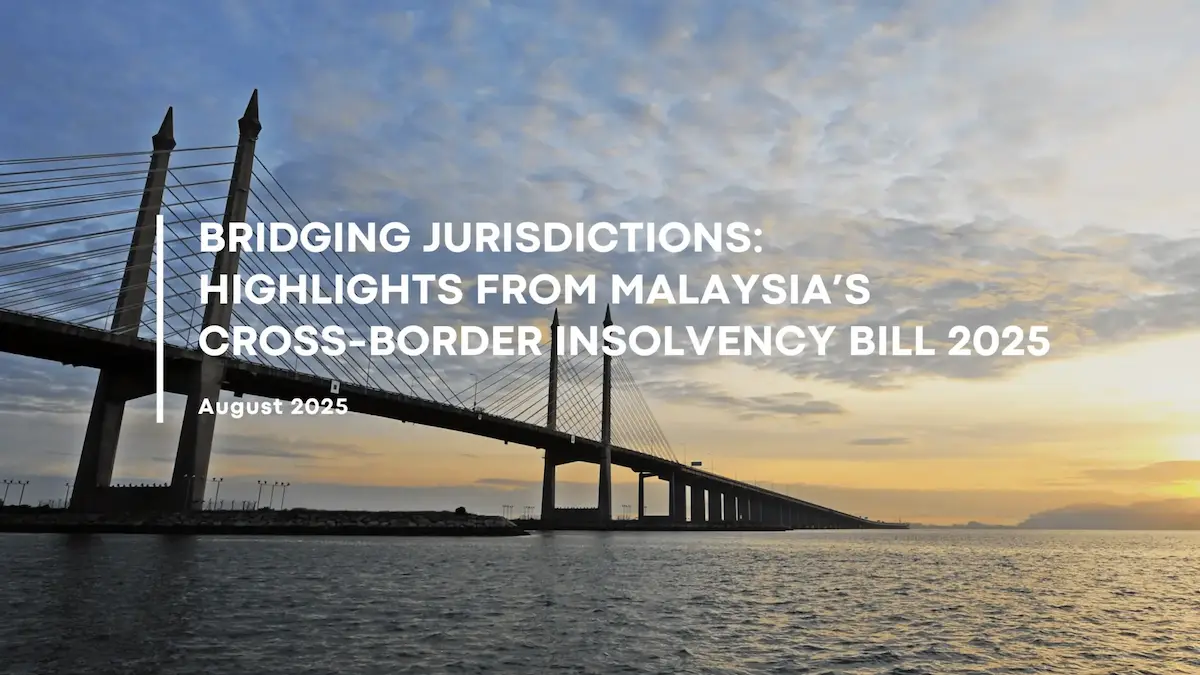A. Introduction
The Model Law on Cross-Border Insolvency (“Model Law”) was adopted by the United Nations Commission on International Trade Law (UNICITRAL) in 1997. It was designed to assist countries in equipping their insolvency laws with a modernised and harmonised legal framework to effectively address cross-border insolvency and restructuring cases.
With the increase in the number of cross-border insolvency cases, the adoption of the Model Law has also, in recent times, increased. The Model Law has been adopted in 63 jurisdictions, including the UK and Singapore.
Malaysia will soon be added to the list following the passing of the Cross-Border Insolvency Bill 2025 (“Bill”) in the Parliament on 29 July 2025, pending gazettement.
B. Key Features Introduced by the Bill
The Bill is largely modelled after the Model Law. It aims to establish a legal framework capable of addressing insolvency issues involving cross-border assets and international creditors. In this regard, it is important to note that the Bill is only applicable to corporate insolvency.
In this article, we summarize the four key features of Bill as modelled after the Model Law, namely access, recognition, relief and cooperation and coordination.
1. Access of foreign representatives and foreign creditors to Courts in Malaysia
The Bill provides the right of direct access for foreign representatives and foreign creditors to the Malaysian courts. This right allows a foreign representative to apply directly to the Malaysian Courts for recognition of foreign proceedings or for any relief or assistance provided under the framework. Such rights include the right to commence and participate in proceedings under the Malaysian insolvency law. Further, the Bill entitles a foreign creditor the same rights as creditors in Malaysia to commence and participate in proceedings under Malaysian insolvency law.
2. Recognition of foreign proceedings
Under the new framework, a foreign representative may apply to the Malaysian Court to recognize the foreign proceedings in which a foreign representative has been appointed. The main supporting document required are proof of the existence of the foreign proceedings and appointment of the foreign representative.9 Once such documents are shown, the court may even presume that the foreign proceedings are recognised in Malaysia.
The recognition of foreign proceedings as foreign main proceedings carries the following effects:
a) the commencement or continuation of any individual action or proceedings in relation to the property, rights, obligations or liabilities of the debtor shall be stayed;
b) any execution against the property of the debtor shall be stayed; and
c) any right to transfer, encumber or otherwise dispose of any property of the debtor shall be suspended.
The term “Foreign main proceedings” is defined under the Bill as foreign proceedings taking place in a foreign state where the debtor has its centre of main interests. While “centre of main interests” is not defined in the Bill, the EU Regulation on insolvency, describes it as a place where the debtor conducts the administration of its interest on a regular basis, and which is ascertainable by third parties. Under the Bill, in the absence of contrary proof, the debtor’s place of registered office is presumed to be its centre of main interests.
3. Relief
There are various reliefs, both interim and final, that the Court is empowered to award under the Bill. These reliefs are necessary for the orderly and fair conduct of cross-border insolvency cases.
Upon the filing of an application to recognise foreign proceedings, the Court may, on application of the foreign representative, grant reliefs of a provisional nature, if it is determined that such relief is urgently needed to protect the property of the debtor or interest of the creditor. Such relief includes, among other things, staying of execution against property of the debtor or entrusting the administration of the property of the debtor (of a perishable nature) to the foreign representative or Malaysian insolvency officeholder.
Upon the recognition of the foreign proceedings, the reliefs that may be granted are more extensive, and includes the following, in addition to those similar in nature to the interim reliefs:
a) the examination of witnesses, the taking of evidence or the delivery or production of information concerning the property, affairs, rights, obligations or liabilities of the debtor;
b) entrusting the administration or realisation of the whole or any part of the property of the debtor located in Malaysia to the foreign representative or such other person as the Court may appoint, for the purpose of protecting and preserving the value of such property; and
c) an order that may be available to a Malaysian insolvency officeholder under the laws of Malaysia.
4. Cooperation and coordination with foreign courts and foreign representatives
Finally, the Bill provides for cooperation and coordination between the Malaysian courts and foreign Courts. It empowers the Malaysian Court to cooperate and to communicate directly with the foreign counterparts. It also empowers a Malaysian insolvency officeholder to cooperate to the maximum extent possible with foreign courts and foreign representatives. The form of cooperation includes, among other things, the coordination of the administration and supervision of the property and affairs of the debtor.
Further, as a form of coordination, after the recognition of a foreign main proceedings, any proceedings under Malaysian insolvency law in relation to the same debtor will be limited to its property located in Malaysia and, to the extent necessary to give effect to cooperation and coordination with the foreign courts, other property of the debtor.
C. Conclusion
In summary, the Bill aims to align Malaysia’s Insolvency laws with international standards. Adopting the Model would further modernise the existing legal framework, facilitate the resolution of complicated cross-border insolvency cases, and support Malaysia’s integration with the global financial and legal landscape.
There are expectations on the Bill to provide clear, comprehensive and practical procedures and guidelines for the recognition and coordination of cross-border insolvency proceedings. This would in turn encourage foreign investments in Malaysia due to the legal certainty for trade and investment.
© TSL Legal
This article is intended to provide general information only and does not constitute legal advice. It should not be used as a substitute for professional legal consultation. We recommend seeking legal advice before making any decisions based on the information available in this article. TSL Legal fully disclaims responsibility for any loss or damage which may result from relying on this article.
This article is contributed by our interns Lishanthan Kumar and Henrick Yong Jin Hern.
Further information
Should you have any questions on the implications of this Act or how this development may affect you or your business, please get in touch with:

